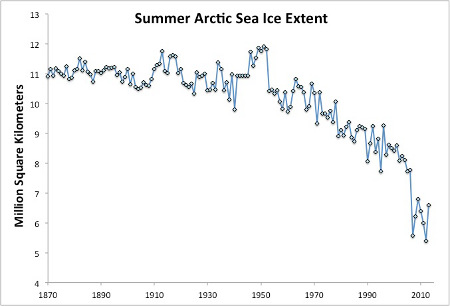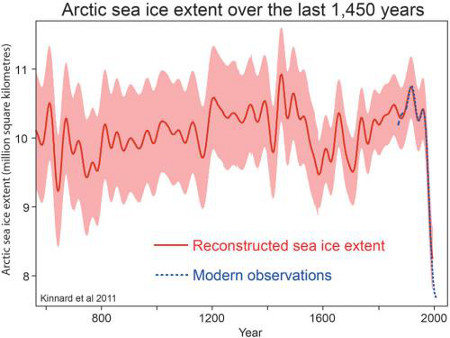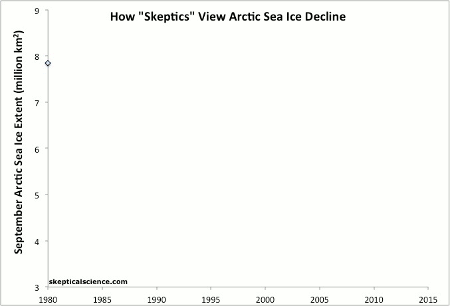Arctic sea ice "recovers" to its 6th-lowest extent in millennia
Posted on 19 September 2013 by dana1981
As Suzanne Goldenberg reported in The Guardian yesterday, Arctic sea ice appears to have reached its annual minimum extent, at approximately 5.1 million square kilometers. This is the 6th-lowest extent since the satellite record began in 1979.
But in fact, scientists have also reconstructed Arctic sea ice extent data much further into the past. For example, Walsh & Chapman from the University of Illinois have estimated sea ice extent as far back as the year 1870 using a vast array of data (for example, records kept by the Danish Meteorological Institute and Norwegian Polar Institute, and reports made from ocean vessels). While climate contrarians will sometimes try to argue that Arctic sea ice extent may have reached similar lows to today's in the 1920s or 1930s–1940s, the data compiled by Walsh & Chapman tell a very different story.

Average July through September Arctic sea ice extent 1870–2008 from the University of Illinois (Walsh & Chapman 2001 updated to 2008) and observational data from NSIDC for 2009–2013.
Going back even further in time, a study published in the journal Nature in 2011 used a combination of Arctic ice core, tree ring, and lake sediment data to reconstruct Arctic conditions going back 1,450 years. The result is shown below.
Reconstructed Arctic sea ice extent over the past 1,450 years, from Kinnard et al. (2011)
A study published in 2010 by 18 leading Arctic experts examined Arctic records throughout geologic history and concluded,
"The current reduction in Arctic ice cover started in the late 19th century, consistent with the rapidly warming climate, and became very pronounced over the last three decades. This ice loss appears to be unmatched over at least the last few thousand years and unexplainable by any of the known natural variabilities."
Thus the scientific data and literature indicate that this year's minimum Arctic sea ice extent is not just the 6th-lowest in the past 34 years, but most likely the 6th-lowest in at least the past few thousand years.
The current Arctic sea ice decline is remarkably rapid, and often referred to as a "death spiral." As Dr. Julienne Stroeve from the National Snow and Ice Data Center (NSIDC) told The Guardian,
"Overall, the Arctic has lost about 40% of its sea ice cover since 1980. Most scientists believe the Arctic could be entirely ice-free in the summers by the middle of the century – if not sooner."
The Arctic ice has also been thinning rapidly, losing approximately 75 percent of its summer volume since 1980.
So what to make of the many claims over the past two weeks that the Arctic sea ice is "recovering"? These counter-factual arguments primarily originated from David Rose at the Mail on Sunday, whose article Bob Ward accurately described as containing "embarrassing errors" to the extent of being a "humiliation" for the Mail on Sunday.
Unfortunately many other media outlets (the Telegraph and Fox News, for example) assumed David Rose to be an accurate source of climate information – despite his long track record of getting nearly everything he says with regards to climate change wrong – and echoed Rose's embarrassing errors. Rush Limbaugh engaged in what Graham Readfearn has described as 'a bad game of Chinese whispers,' amplifying Rose's errors further by wrongly asserting,
"Now, if you haven't heard this, the ice at the North Pole, arctic ice, is at a record amount this early in the post-summer season."
Sadly, the climate contrarian media echo chamber (which has been working overtime in advance of the publication of the next IPCC report) has taken factually inaccurate reporting and twisted reality even further, asserting that the 6th-lowest Arctic sea ice extent in millennia is "a record amount."
In reality, because last year's Arctic sea ice minimum shattered the previous record low, and the ice had declined the previous two years as well, statistically speaking a short-term 'recovery' this year was likely to happen. In fact, it was predicted by most Arctic climate experts.
However, when we examine the long-term trend in the Arctic sea ice extent, it becomes clear that contrarian declarations of a "recovery" are based on viewing the data through Rose-colored glasses.
September Arctic sea ice extent data since 1980 from NSIDC (blue diamonds). "Recovery" years, meaning years when the sea ice extent is greater than the previous year, are highlighted in red to illustrate how climate contrarians view the data.































 Arguments
Arguments
































The 'recovery' reminds me of an addict. Every time they go straight for a day, they're 'recovered'
I pressed submit a bit prematurely, but the above graphic suggest that Arctic Ice is perhaps taking a "break" or pause (sarc/ irony).
Thanks for this, Dana. I had overlooked it before, but now I notice the outlier in about 1940 - one of the lowest summer minimums in the entire record. I presume this is why we hear so much about a US submarine that surfaced at the North Pole in the 1930s.
Personally, I am really sick and tired of willfully blind and/or ideologically-prejudiced people cherry-picking the only single data point that can support the belief that ongoing change is not due to the exponential growth of CO2 emissions in the last 250 years.
If I was a famous climate scientist, people who like to hack into email servers and selectively quote from their contents would, of course, quote me as admitted that, "ongoing change is not due to the exponential growth of CO2 emissions".
When Lord Monckton was preaching here in AU, his Arctic Ice "recovery" of 2008-2009, he was cherry-picking the two-year "trend" as the basis for his teachings. Note, that he was teaching his rubbish confidently in the middle of 2011, when data of 2010 melt season was available, contradicting him. Apparently he could afford that, likely vause his prefered audience did not know the facts.
Today, David Rose, incidentally Monckton's compatriot, is not waiting for 2 year of "recoveries", but jumping at a single 2013 straight on. He's beaten his lord on that. Likely reason: "report it until hot, don't wait the news to be spoiled by the uncertain future!". Amazing, what an extraordinary race of ignorance. Honestly, I thought Monckton would not be beaten on that subject. But he's just been!
Meanwhile, I think Wieslaw Maslowski's prediction of ice free Arctic (2016 +/- 3y)* is still on track, given the PIOMAS volume models This year Sept volume was marginaly higher than last year, with pretty much the same thinkness. So, the ice in as vulnerable as it's been, no real recovery. That's what you conclude when you look at the data rather than "Rosy" race of ignorance.
* "Rosy" media reported it as if Maslowski's said "ice free Arctic in 2013" reporting only the lower uncertainty range, in an effort to portray him as "alarmist".
I've had an argument the other day with some die-hard contrarians. They were claiming SkS is not credible. After asking for an example of 'deception', Arctic escalator was chosen. So called deception was a missing data point for a 2013 minimum. I kid you not!
So I pointed out that Arctic sea ice extent minimum was yet to be reached and promised them not to link any of your articles until you update the escalator by the middle of October. Looks like you beat my deadline by almost one month. :)
Bob Ward's article is a must read! His conclusion:
"However, these latest howlers are likely to cause most embarassment, not just for Rose, but also for Geordie Greig and Gerard Greaves.
And it should also provide a sobering lesson for other editors and reporters who have been treating the ‘The Mail on Sunday’ is a credible source of ‘sceptical’ stories about climate change."
Amazing that people like Rose can repeatedily misrepresent, distort and worse, and get off Scott free. IMHO, Greig and Greaves should step down, or they can stay but Rose is made to leave. Eithe rway, someone at The DAily MAil and The Telegraph out to pay dearly for this.
PS: I too calculated the August-August change in sea ice, but I went to the actual data provided by NSIDC and cross-referenced it with data from JAXA. That is what Rose should have done, or at least what a credible journo would have done.
@Albatross #7: Here's another "must read" article about Rose and his recent articles.
UPDATE: Despite Doubling Down, Climate Change Article Still Very Misleading by Phil Plait, Slate, Sep 18, 2013
Do you notice that every year we have a record minimum for Arctic sea ice extent the following year it always 'rebounds'? Just because it has of course doesn't mean it always will. But it does go to show that this year's regression to the mean is totally un-newsworthy.
The animated graphic of Arctic sea ice decline reminds me of the inevitable total loss of starting monies an addicted poker machine/slot machine player would experience. They only register the 'wins' and fail to see the full picture of their cumulative losses until it is too late. Bert
@ Bojan,
You can share this with them:
@Daniel Bailey, where is this citation from?
Anyway, I'm pretty sure it will be dismissed as an appeal to authority. Yes, they can have it both ways. ;)
Last year contrarians were emphasizing the summer storm that helped reduce the arctic sea ice extent.
This year, of course, they have had to forget about it, thus deliberately ignoring one element of the natural variability that makes up this "recovery": one that they were only too happy to acknowledge last year when it suited their purposes.
Bojan,
The citations, plaudits and accolades from the science community towards Skeptical Science are legion.
This is tracked internally at SkS. At some point this may be made accessible to the public.
Its resources are used in classes all over the world.
I get notifications of activity that detail this (I am an admin here at SkS).
Science institutions link to it from their websites.
Various scienctific organizations have linked to SkS in articles on their websites and some list SkS in their listings of online resources.
Scientists volunteer to write guest posts and rebuttals appearing on the site.
Many guest posts and rebuttals here at SkS have been written by publishing scientists. A number of regular members of SkS are publishing scientists.
"Anyway, I'm pretty sure it will be dismissed as an appeal to authority."
They may. However, it is no more valid than their dismissal of SkS as an authority in the first place. The facts remain, every post at SkS is built from and draws upon the primary literature published in reputable journals, and includes hyperlinks to the source articles.
That some would dismiss the primary literature as a source is very telling as to their agenda of disinformation they prosecute.
I can see that Artctic ice loss is important for (1) its effects on flora & fauna (2) feedback effect of albedo change (3) that it's highly anomalous at least 1,500 yrs so shows something highly anomalous "going on" (lines of evidence) but it's minor at most insofar as an indicator whether "global warming" is currently more, less or same as before. Balmaseda, Trenberth & Källén ORAS4 Ocean Heat Content Reanalysis claims 220 ZettaJoules added to oceans 1975-2010 and I compute 50k km**3 Artctic ice reduction by eyeballing the graph using (from Sinclair's video) 6m to 1m thinning (somewhat less with Dana's 75%) and that's 15 ZettaJoules used, so it's 7% of "global warming" so miniscule, irrelevant, whether it's up or down a tad in terms of an indicator for "global warming" change (if that's what this David Rose was hinting or inferring).
I can't help wondering if 6th lowest is accurate. The NSIDC is a model, somewhat constrained by measurements and the measurements of any patch of water with more than 15% ice show up as complete ice cover. This year there has been a preponderance of low pressure counterclockwise rotating weather systems in the Arctic which tend to disperse ice (coriolis). What is needed is the Cryosat measurements from the past three years. It could be that the ice volume this year is only a little above the ice volume for 2012. (or not). When is Cryosat going to finish groundtruthing their data and publish a periodically updated graph of ice volume similar to the ice extent graphs from NSIDC. By comparing the signal strength from ice reflection and water reflection, Cryosat should also give a better estimate of ice extent.
Good article, but I'm surprised no mention was made of the 'winter' ice conditions.
Seems that those numbers are also dropping
New satellite data measures Arctic sea ice volume at record low
9/16/2013
~ ~ ~
Esa's Cryosat mission observes continuing Arctic winter ice decline
9/11/2013
~ ~ ~
CryoSat at a glance
http://www.esa.int/Our_Activities/Observing_the_Earth/CryoSat
William,
The NSIDC data are not a model they are measurements. People argue about whether to use area or extent, but 2013 was pretty close on both of those. The NSIDC data go back to 1979 and are solid. Discussions can take place on how thick the ice is, but the bottom line is the ice recovered this year. Scientists do not expect a straight line down, there is still internal variability.
@michael sweet #18 based on graph with this post, Arctic sea ice late summer extent did not recover this year as you state. It was/is in remission. Consider analogy of person with cancer, Dr. gets latest list of measurements & symptoms, finds this slight improvement, calls patient being treated to office and says "you've recovered". Useless Dr.
Gringup Baker,
I agree that the long term prospects for the Arctic is down. This year was higher than last year. If you use the denier standard that any non-record year is a recovery it has recovered. If you feel that sixth lowest in the past 2,000 years is a slight improvement but not a sign of recovery that is has not recovered. I personally expect the arctic sea ice to be lower next year, but it might be cold again for another year or two.
As an addition to my earlier comment about scientific bodies referencing SkS, here's an example of NASA referencing SkS at it's Earth Observatory website:
Have a Question about Climate Science? #askclimate
My favorite was their response to this question:
Q: What is the main argument people have when they refute climate change?
A: Two (contradictory) favorites are 1) we don’t know anything and 2) it’s just natural. Neither are true. More at http://www.skepticalscience.com/argument.php
@Daniel, of course, I agree with every word. That you draw your conclusions from quality papers is what I always like to point out. Realclimate is also great in this regard. Thanks!
just testing the thumbs down voting system...
looks like it works. how do I make it go to zero again?